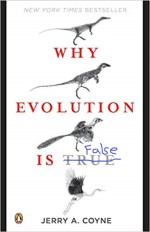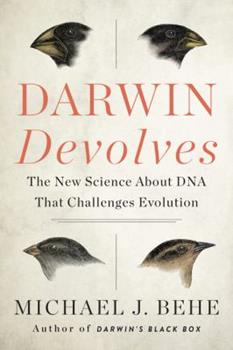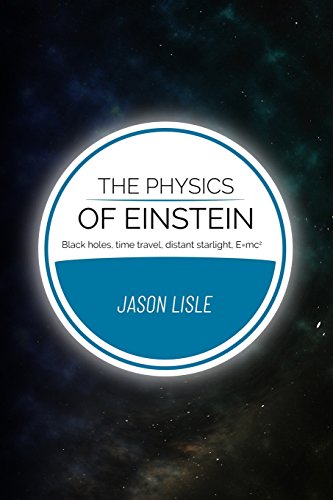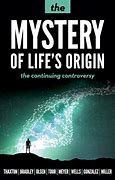
January 26, 2010
ISBN-13: 978-0143116646
After finishing this book, I took a marker and re-titled it "Why Evolution Is False" (see below).
As an informed Creationists, this is a very satisfying book to read! Gone are the days that we creationists are faced with strong evidence for evolution that requires us solely rely on our faith in God's Word. The evidence is now on our side. That is not a statement I would have made decades ago when I first studied this topic. But I can make it now.
This book is written by a very intelligent and informed evolutionary professor. Those who know professor Coyne also know he has an attidude. He is a die-hard atheist and hater of Intelligent Design and Creationism, and is NOT shy about that. With this book, he has done is absolute best (right down to his title) to convince the world "evolution is true". He has certainly poured a great deal of research and effort into this book, and it shows. And that is exactly why I can say that I am glad to have read it.
For this review, I'll break it into two parts: Philosophy & Science, since they both seem to play a significant role in this book
Philosophy
First, Coyne doesn't just stick to science in this book. He includes a dose of philosophy, such as what can be seen on page xiii:
The battle for evolution seems never-ending. And the battle is part of a wider war, a war between rationality and superstition. What is at stake is nothing less than science itself and all the benefits it offers to society. [emphasis mine]
Nonsense (except for the first sentence. Better get used to it Coyne!).
Much of this statement is too ignorant to reply to. However I simply must highlight the utter absurdity that 'science is at stake' (define 'science'!), and that somehow society will suffer for it if we don't embrace Darwinism. It's statements like this that lead me to believe that Creationists are better positioned to do Operational Science.
Second, quite often Coyne uses the "Why would God..??" argument, like what is seen on page 91:
Why would a creator put plants that are fundamentally different, but look so similar, in diverse areas of the world that seem ecologically identical? [emphasis mine]
This comment, and the section immediately follow it give us a great deal to talk about. Expand these sections for more:
This the classic "If I were God..." argument. It's purely philosophical, having nothing to do with science. I honestly find it quite odd that he even tries to offer up this argument, let alone use it continually throughout his book.
This section of the book gave me my favorite laugh-out-loud moment.
First some background: we creationists can't help but chuckle every time we see the phrase
For a better understanding on this problem for evolutionists, read the quick description posted here. Basically, when evolutionists find two things that look far too similar than they should (no direct lineage), they respond with: "Wow, look how powerful evolution is, it independently created two things the same way", and call it a fancy term: "convergence".
"convergent evolution"
. The growing abundance of unrelated similarities requiring the application of of the term "convergence" is actually a problem for evolution.

Getting back to Coyne's book. Immediately following the quote above he gives the example of cacti and euphorbs (see picture), noting that these two plants appear on separate continents, yet look remarkably similar. What's more problematic is that although they both are found in deserts regions, these desert regions are not truly 'ecologically identical'. Even if we believed in Darwinian evolution, there's no observable macro-evolutionary evidence to convince us that if you 'rolled back the clock' on the same desert, that you would get the exact same results. There's too much This is another humorous topic. I enjoy watching the cognitive denial from evolutionists that insist "evolution is not random!" Good luck with that... randomness in the process . So only in the fanciful imaginative minds of evolutionists would two different regions of the globe produce two identical plants.
He also goes on to describe other vastly separated, yet similar looking life forms: Anatomically similar marsupial and placental mammals that appear on separate continents.
As I'm reading Coyne address these problems, after unbelievably suggesting this is problem for creationists (see next section) utters this gem on p. 92:
But evolution does explain the pattern by invoking a well-known process called convergent evolution. It's really quite simple.Wow.
I literally laughter outloud when I saw that. I can't tell you how many times we Creationists watch evolutionists take problems with evolution and spin them around as 'evidence for evolution'! It happens a lot, and this is a classic case. He actually tries to use this as evidence for evolution! Convergent evolution isn't a "process" that can be invoked! There is NO observational evidence of macro-evolutionary convergent evolution. It's an excuse for a problem. And a growing one at that!
And that last "really quite simple" comment shows the depth of the evolutionary bubble he lives in. Thank you Coyne for that comic relief...
So as Coyne is describing this problem of similar looking organisms (see previous section), he says the following just prior to the quote above:
No creationist...has offered a credible explanation for why different types of animals of similar forms in different places. All they do is invoke the inscrutable whims of the creator.
Honestly this statement hovers around the ignorance threshold and ought to be ignored, other than to point out the fact that Coyne obviously is clueless about the creation model. No wonder he keeps uttering these nonsense "why would the creator do that??" statements. It's because he doesn't understand the creation model! Every creationist know full well that what he just described over the last two pages is rock-solid evidence FOR the creation model. The processes defined by the model explain the observations we see quite well! It's not some 'inscrutable whims' of God. Coyne looses tremendous credibility with statements like these.
Science
This section could obviously get quite large. Fortunately I have another article that addresses the majority of the topics in this book.
Basically I can easily conclude that the scientific evidence in this book IN NO WAY poses a challenge to the Creation model. As for the question "But does it support Evolution?", read on...
Why Evolution is True False
NOTE: For an even better review of this book, and answer to this question, see Jonathan Wells's review here
This book helps highlight why Creationists are fully convinced that evolution is false despite the fact that many people believe in it. This book focuses entirely on evidence for evolution and insufficiently addresses the evidence against it. I can sum up why this book shows Creationists that evolution is false with two very important concepts:
- Evidence presented in this book overlaps with the Creation model. To move a Creationists away from their model, you need to present a data shown to exclusively be supported by neo-Darwinism. That is not done. The most he offers are the void "Why would a creator..." arguments described above.
- There are too many broken links in the chain, too many problems with neo-Darwinism for it to be true. Evolutionists ignore them. Creationists don't. This book certainly doesn't address those.
When you combine those two together, it's not hard in the least to pick up this book, read it cover to cover, and say "Yep, evolution is false".
Caveat
To an 'evolutionary novice', this book can seem rather convincing, and IS SO to many people. So although I recommend this book to fellow Christians, don't just pick up this book unless you are willing to use it as a point of reference to then go and study each topic. Use it as a catalyst for research: either before reading this book, or while reading it. To those willing to read this book, and RESEARCH each topic, I assure you, you WILL find it very satisfying!!









